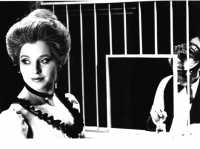
Forty Years Ago: RWF’s WHITY
 New Orientation towards Hollywood
New Orientation towards Hollywood
Shot in 1970 in Almeria, Spain, the production cost of 680,000 deutschmarks made Fassbinder’s WHITY his most expensive to date when it premiered at Berlin’s 21st International Film Festival on July 2, 1971. The public reacted somewhat reserved, and no distributor was found for the film. It was not until the 1980s that the private TV station Pro 7 first introduced the movie to a larger audience.
Fassbinder placed the melodrama’s plot in the year 1878 in the American Southwest, where the shattered Nicholson family lives in their mansion: Gentleman farmer Ben Nicholson (Ron Randell), his nymphomaniac second wife Katherine (Katrin Schaake), the two sons from the first marriage, the homosexual Frank (Ulli Lommel) and the mentally ill Davy (Harry Baer). Whity (Günther Kaufmann), the family’s servant and Ben’s illegitimate son with the black cook, suffers from the power struggles between the relations and finds a confidante in the bar singer Hanna (Hanna Schygulla), whom he adores and secretly loves. In the hope that Whity will overcome the paralyzing dependencies, the members of the Nicholson family motivate him to kill his father and his half-brothers. Whity executes the verdict the Nicholsons have long since pronounced upon themselves. Supposedly feeling free from the “ruling system of familial suppression,” he leaves the small town with Hanna. But their freedom leads them to the desert—an homage to Josef von Sternberg’s MAROKKO from 1930—where presumably only death awaits the lovers.
For Fassbinder and the antiteater ensemble this film not only meant a new genre and a new spatial orientation towards Hollywood, but also an artistic alienation within the group. First, they had to get used to international filming customs, then to the beginning cooperation between Fassbinder and his director of photography, Michael Ballhaus, to foreign colleagues, and to Ulli Lommel’s financial difficulties: This was the first time that the latter served as executive producer. Nevertheless, WHITY inspired Fassbinder to a new approach and awareness of film as medium, which soon thereafter, led to his tenth feature film: BEWARE OF A HOLY WHORE (1970), wherein he implemented his new experience in insightful ways. WHITY also led RWF to new films, most importantly a critical evaluation of Douglas Sirk’s melodramas, subsequently reflected masterfully in film number 13: MERCHANT OF FOUR SEASONS (1971).
More Information:
RWFF Filmography about WHITY
Photo left: Günther Kaufmann in WHITY, 1970 © RWFF
Photo right: Hanna Schygulla in WHITY, 1970 © RWFF